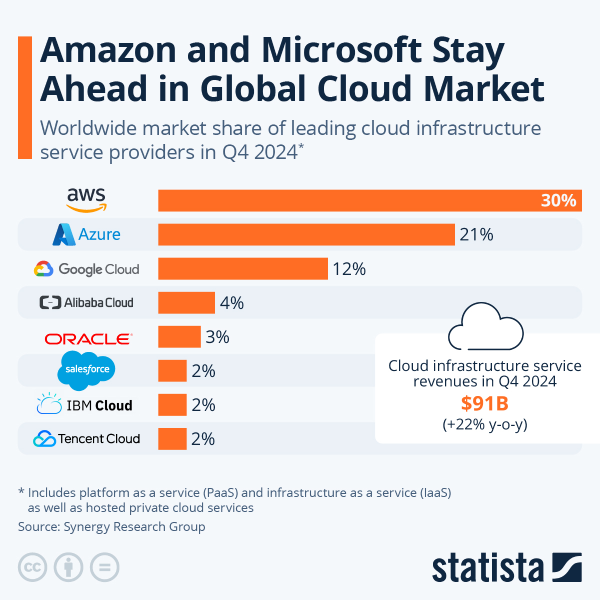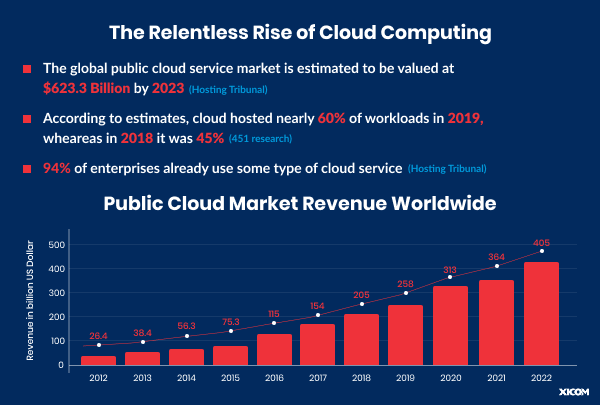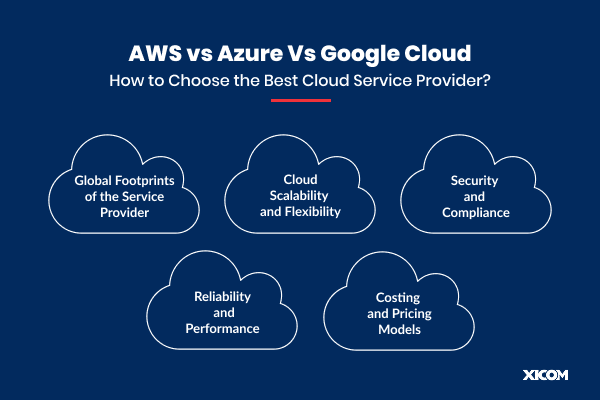Mar 21, 2025 Cloud & Devops
AWS Vs Azure Vs Google Cloud: Which is the Best Cloud Platform?
Mar 21, 2025 Cloud & Devops
Table of Contents
Mar 21, 2025 Cloud & Devops
The way the cloud computing market is growing, businesses are finding it hard to pick the right cloud platform to migrate their business data. In the massive cloud market, comparing AWS vs Azure vs Google Cloud platforms is quite challenging as your one decision will shape the future of your organization’s digital journey.
In the dynamic realm of cloud computing, Microsoft’s Azure, Amazon Web Services (AWS), and Google Cloud platform are the titans of the industry and acquiring 63% of the cloud market share.

Still, when it comes to hosting a website or application, many users are relying on these three platforms. Cloud computing has emerged as a top software development trend that has a long way to go. It is no longer a question of whether businesses should adopt cloud services; the real challenge lies in deciding which one is better, AWS or Azure.
Though with the increasing demand for cloud platforms, today there are numerous cloud platforms to choose from, but Amazon Web Services, Azure, and Google Cloud Platform are the dominating service providers.
Before you head straight to finalize any cloud service provider, you must ask what distinguishes each of “The Big Three” cloud services. And how will you judge which platform is ideal to opt for your company?
To make an informed decision, let’s look at the big picture of Cloud computing and then take an overview of major cloud service providers…
Cloud computing refers to the delivery of on-demand computing services which includes servers, storage, databases, networking, hosting, and more over the cloud platforms. All of these resources are available to access based on the pay-per-use model.
This is one of the major reasons why businesses are moving towards cloud computing services. Instead of heavily investing in computing equipment and incurring upfront expenses, businesses can access these resources on-demand from the leading cloud service providers including AWS, Azure, and GCP (Google Cloud Platform).
So here are two key highlights about the inclining interest of businesses toward cloud migration services:
Now the question is why does it matter?
Before you get trapped in the detailed comparison of Google Cloud vs Azure vs AWS Services and their other details, let’s understand why cloud computing matters:
In recent years, cloud computing services have witnessed a monumental shift in demand as it is offering a modern way of operating a business which ultimately leads to sustainable long-term growth, improved efficiency, no risk of data loss, and centralized accessibility to operations.
Almost, the entirety of business enterprises have migrated some form of their business operations to cloud computing. Whereas well-established enterprises are strongly intent on transforming digitally through cloud computing or using SaaS-based services.
Cloud computing is now the mainstream technology as the vast majority of businesses are leveraging its capabilities for various aspects of their business.

The popularity of cloud computing is unstoppable. But advantages businesses can leverage by adopting cloud computing:
To conclude which one is better, AWS or Azure, or Google Cloud, it’s important to understand that each service provider has its own nuances and strengths to offer. So before you head straight to hire a software development company to migrate data to the top cloud platform, explore some basic information about each provider to analyze their difference.
Amazon Web Services was launched in 2006 and offered basic cloud computing services to businesses based on pay-as-you-go. It was started by providing just a few services like storage and computation which was quickly expanded to the next level and has become a market leader with 30% of the market share.
Compared to other major cloud computing platforms, AWS is the first in the market offering 18000+ services that include everything from computing, content management, and delivery to data storage services and Data Analytics and ML.
AWS is used by a wide range of businesses from startups to leading enterprises including Expedia, Netflix, Coca-Cola, CoinBase, Airbnb, and more.
Azure is the second most demanding cloud platform launched in 2010. It is growing faster than AWS with an annual growth rate of 46% and acquiring 21% of the market share. It is particularly launched to offer tailored Microsoft-centric support to enterprises.
Since its inception, it has grown to become a cloud-based platform with over 200 goods and services. The wide range of customized services for enterprises makes a huge transition to a cloud or hybrid-cloud environment.
With more than 95% of Fortune 500 firms using it, Microsoft Azure has established a track record of serving enterprise users. Major companies including Starbucks, Asos, Center of Disease Control (CDC), HP, HSBC, and more are the major users of Azure.
Google Cloud is the third titan of the cloud computing world which is quite different among others. While saying AWS and Azure are pronounced competitors, Google Cloud is equally trotting the racetrack.
Today, Google Cloud offers more than 100 services and acquires 9% of the cloud market space. However, Google Cloud is not limited to the suite of Infrastructure-as-a-service(IaaS), Platform-as-a-service (PaaS), IoT integration and control. Rather GCP provides exceptional support to the app using AI and ML Capabilities.
In addition, owing to Google’s near-hegemonic status in the sphere of technology, Google Cloud has been professed to surpass its competitors and will become the leading cloud platform in the near future. When recalling Google cloud competitors, AWS and Azure are the tough competitions.
Selecting the right cloud service provider between AWS, Azure, and Google Cloud- depends upon various factors. The major factors that influence your decision include your business requirements, budget, security, and scalability goals. Understanding each provider’s strengths and weaknesses will help you make a better decision.
Before you weigh the pros and cons of each service provider, here are a few factors to consider to make the right choice.

The size of a provider’s global footprint directly impacts data storage, backup, and disaster recovery. The wider footprints can store and back up your data in more geographic locations.
Moreover, having access to more regions, availability zones, and edge locations means more room to grow and enables you to take your services closer to target customers and reduce latency.
So before you make a choice, verify that your preferred Availability Zone supports the actual service you require.
Top cloud service providers offer auto-scaling, and with the help of cloud consulting services, you may easily figure out the best service provider. But remember, ease of use and configuration can greatly vary, depending upon your requirements. Look for the providers who help you easily scale resources up and down based on your changing needs.
Security is the top priority when it comes to migrating data to cloud platforms. But the specific data encryption access controls and security auditing techniques that each provider uses, may differ.
Select a provider that has a good track record of providing unmatched performance. You need to consider SLAs (Service Level Agreements) of specific services you plan to use rather than just considering the provider’s overall uptime rating.
All three service providers offer pay-as-you-go pricing, reserved instances, and commitment discounts. However, the ultimate pricing structure may differ depending upon various factors including where you hire a software developer, which company you choose for cloud computing services, and more.
Of course, all these Top 3 Cloud Providers have in-depth experience and competence to deliver dependable and feature-rich cloud infrastructure. But before you incline to any specific cloud platform for your business, let’s compare the strength and capabilities of each cloud provider on different parameters.
Though a quick look at this detailed comparison guide may lead you to believe that AWS cloud solutions are leading over Azure, a closer examination of these providers reveals that the choice isn’t so easy to make.
Each cloud service provider offers a diverse range of computing resources to support various business requirements.
In a nutshell: AWS is an extensive suite well suited to businesses looking for scalability, high-end performance, and flexibility. Whereas Microsoft Azure offers powerful resources tailored for enterprises and hybrid cloud environments. Google Cloud Platform provides highly customizable computing resources, specially optimized for all the latest technologies including AI, Big Data, and containerized workloads.
AWS vs Microsoft Azure vs Google Cloud: What Resources and Products Do They Offer?
| Category | AWS (Amazon Web Services) | Azure (Microsoft Azure) | GCP (Google Cloud Platform) |
| Compute | Amazon EC2 (Elastic Compute Cloud) | Azure Virtual Machines (VMs) | Google Compute Engine (GCE) |
| Serverless Computing | AWS Lambda | Azure Functions | Google Cloud Functions |
| Containers & Kubernetes | Amazon ECS, Amazon EKS | Azure Kubernetes Service (AKS) | Google Kubernetes Engine (GKE) |
| Platform as a Service (PaaS) | AWS Elastic Beanstalk | Azure App Service | Google App Engine |
| Storage & Databases | Amazon S3, Amazon RDS, DynamoDB | Azure Blob Storage, Azure SQL, Cosmos DB | Google Cloud Storage, Cloud SQL, Bigtable |
| Networking & Content Delivery | Amazon VPC, CloudFront | Azure Virtual Network (VNet), Azure CDN | Google Virtual Private Cloud (VPC), Cloud CDN |
| AI & Machine Learning | Amazon SageMaker, Rekognition | Azure AI, Azure Machine Learning | Google AI Platform, Vertex AI |
| Big Data & Analytics | Amazon Redshift, AWS Glue | Azure Synapse Analytics, Azure Data Lake | Google BigQuery, Cloud Dataflow |
| Security & Identity Management | AWS IAM, AWS Shield | Azure Active Directory, Azure Security Center | Google IAM, Security Command Center |
| IoT Services | AWS IoT Core, AWS Greengrass | Azure IoT Hub, Azure Sphere | Google Cloud IoT Core |
| Hybrid & Multi-Cloud Solutions | AWS Outposts, AWS Snowball | Azure Arc, Azure Stack | Anthos |
| Monitoring & Management | Amazon CloudWatch, AWS Config | Azure Monitor, Azure Policy | Google Cloud Operations Suite (Stackdriver) |
Open-source support is a crucial factor when choosing a cloud service provider, especially for businesses relying on community-driven projects and open-source frameworks.
In a Nutshell: AWS has a long history of working with open-source communities, while the Azure cloud platform is increasingly supporting open-source projects, but surprisingly Google Cloud platform went bigger.
So, when it comes to Google Cloud vs AWS vs Azure: Which platform provides the best open-source support?
| Category | AWS (Amazon Web Services) | Azure (Microsoft Azure) | GCP (Google Cloud Platform) |
| Open-Source Contributions | Supports Apache Kafka, MySQL, PostgreSQL, OpenTelemetry | Contributes to .NET Core, PowerShell, VS Code | Originated Kubernetes, TensorFlow, Go, Istio |
| Open-Source Initiatives | Babelfish for PostgreSQL, .NET Porting Assistant | Azure Open Datasets, Windows Subsystem for Linux (WSL) | Cloud Native Computing Foundation (CNCF) projects |
| Third-Party Open-Source Support | Linux, Red Hat, Terraform, Elasticsearch | Red Hat, Terraform, Databricks, Jenkins | Red Hat, Apache Spark, GitHub Actions |
| Container & Orchestration Support | Amazon EKS (Kubernetes), ECS | Azure Kubernetes Service (AKS) | Google Kubernetes Engine (GKE) |
| Machine Learning & AI Open-Source | Supports PyTorch, TensorFlow, and Hugging Face | Supports ML.NET, ONNX, TensorFlow | Created TensorFlow, JAX, Keras, DeepMind libraries |
| Integration with Linux | Broad support for Linux workloads | Native Linux VM integration & WSL | Built-in support for Linux-based services |
The global presence of the biggest cloud providers is quite essential for businesses and developers seeking the ideal cloud solution for them. The need for a data center will vary based on where an application or website’s users are located.
Here are some more details about how AWS vs GCP vs Azure compare in terms of the number and geographical location of their data centers.
So before you look for cloud migration services to transit your business data or host any app, make sure to check the Availability Zone of cloud service providers.
When it comes to Microsoft Azure vs AWS vs Google Cloud service providers, pricing is one of the most important elements to consider. After all, you will be likely to lock in the pricing of your choice of service provider for such long years.
While comparing the pricing models of the biggest cloud providers, AWS, GCP, and Azure, businesses must select the service provider that best fits their specific needs and budgets.
Each cloud platform adopts a pay-as-you-go model with varying parameters depending on the type, storage costs, data transfer fees, and discounts. Understanding each factor in detail will help you better optimize your spending on cloud computing and migration services.
Here’s a quick AWS, Azure, and Google Price Comparison to help you choose the right one:
| Category | AWS (Amazon Web Services) | Azure (Microsoft Azure) | GCP (Google Cloud Platform) |
| Pricing Model | Pay-as-you-go, Reserved Instances, Savings Plans | Pay-as-you-go, Reserved VM Instances | Pay-as-you-go, Committed Use Contracts |
| Instance Pricing | Various instance types with tiered pricing | Optimized VM families with different cost structures | Predefined and custom machine types |
| Storage Costs | Based on capacity & access patterns (Amazon S3, EBS) | Based on usage & capacity (Azure Blob & Disk Storage) | Based on storage class & access frequency (Google Cloud Storage, Persistent Disk) |
| Data Transfer (Ingress/Egress) | Free ingress and egress costs range from $0.05 to $0.09 per GB | Free ingress and egress costs vary by region and volume | Variable costs based on data volume |
| Discount Programs | Reserved Instances & Savings Plans with upfront payment | Azure Hybrid Benefit for customers with existing licenses | Committed Use Contracts (1-3 years) for discounts |
| Support Plans | Multiple tiers, priced separately | Enterprise-grade support available | Basic, Development, and Production tiers with different SLAs |
When it comes to comparing AWS Vs Azure Vs Google Cloud platforms, all three offer powerful cloud services but each caters to specific use cases.
In a nutshell: AWS boasts global reach and a wide service offering, ideal for diverse applications. While Azure excels in seamless integration with Microsoft ecosystems and ensuring strong security features. Google Cloud is an attractive option for Google Cloud providers.
However, the real challenge is to recognize which cloud service provider should be chosen and when.
Hopefully, with this blog guide, you may have a fair idea about how cloud computing services take a central space in the digital landscape. Using the right fitted cloud service provider, helps businesses control their investment in computer equipment, and allows them to rent a fully feature-rich cloud platform where they can easily manage their operations. By choosing to hire a software developer, you can easily weigh the capabilities and strengths of each cloud service provider and make a decision.
At Xicom, we have a team of cloud consultants who go up and beyond in analyzing your project requirements. They evaluate the requirements and help you make the best decision that ensures scalability, flexibility, and long-term success.
Here we have gathered additional information related to leading cloud service providers Amazon Web Services, Microsoft Azure and Google Cloud Platform.
The ultimate choice of the cloud service provider depends upon various factors. If it comes to choosing based on pricing, then Google Cloud does seem to be at the top of the heap, while AWS and Azure are the most comprehensive when it comes to computing, offering some services, and ensuring the Availability Zones (AZs). In case of popularity and stability, AWS has the longest history and has the widest range of services to offer.
The key difference between AWS vs Azure vs Google Cloud is- AWS dominates the infrastructure in terms of scalability and storage and offering over 18000 services. Azure is majorly focused on providing tailored options to enterprise environments and when it comes to Analytics and ML, Google Cloud is better at high data management and efficient integration with third-party services.
At this moment, because businesses are demanding scalability and flexibility to suit their enterprise environment, therefore Microsoft Azure and Amazon Web Services are considering highly demanding cloud service providers.
Though predicting the future developments of cloud services is quite challenging, we belive Azure will continue to expand and has strong enterprise integration making both AWS and Azure dedicated competitors.